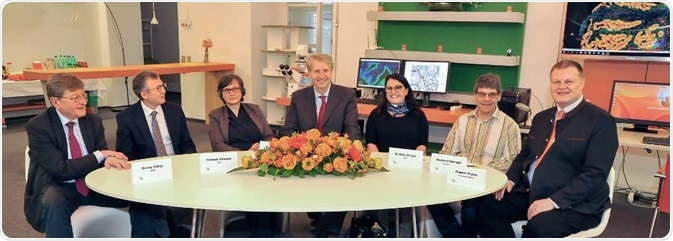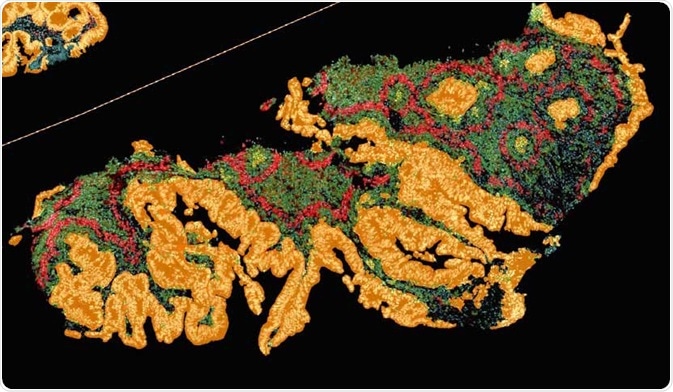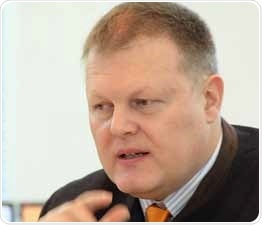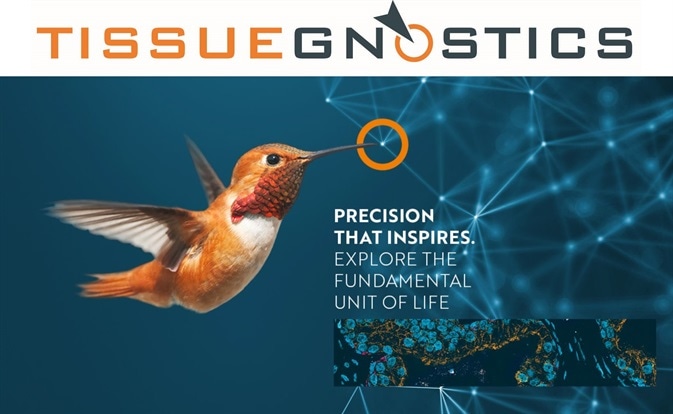Molecules medianet editor Oliver Jonke starts the round table discussion with leading scientists and experts in the precision medicine field.
The participants in the discussion all concur that the term “personalized medicine” is in fact, incorrect. All practicing GPs provide “personalized medicine” just as every doctor who, for example, practices according to the principles of traditional Chinese medicine. The head of the Department of Pathology at the Medical University of Vienna, Renate Kain says, “Doctors focus on the patients as people, talking to them and gathering information about them.”

© medianet/Joe Haider
Yet, this is not what personalized medicine is about, which is further reason the popular term is also misleading. According to Dr Kain, “Nowadays treatment involves incorporating vast quantities of data, comparative data and the corresponding analyses.”
Emeritus professor at the Department of Dermatology of the Medical University of Vienna, Georg Stingl, says that is why personalized medicine has nothing to do with doctors’ rapports with their patients. He recommends using the terms used by scientists instead: “individualized medicine”, “precision medicine”, or “stratified medicine.”
Differences Between Diseases
Stingl says, in principle – it is medicine strongly driven by technology, viewing people or the disease being treated as a molecular whole – and this is where this type of treatment distinguishes itself from treatment focusing on patient rapport.
We can start treatment with a targeted therapy when we establish individualized differences. He says, a simple example is the fact that the same symptoms can be present in distinct but similar diseases. The difference only becomes clear after a precise analysis has taken place.
According to Dr Stingl, “Eczema – known as atopic dermatitis among experts – has about three significant types with the same clinical manifestation. But the trigger is different in each case. When we are able to identify these differences, we also know where we can begin treatment in the first place.” The same is also true of a number inflammatory diseases.

© TissueGnostics

© medianet/Joe Haider (4)
There are not nearly enough pathologists in Austria. We need more teams and centres to expand the field of individualised medicine. At the moment, however, there is a shortage of funds.
Bettina Zelger.
High Costs
The problematic side of this development, where patients receive their own customized medication, becomes readily apparent at the same time, “That is a nightmare scenario, because we cannot afford it,” says Dr Stingl. He states that he does not feel that it is necessary.
The experts agree that the advantage lies in the analysis of data and its use in the development of new medications. What is important is that appropriate medications can be developed and administered accordingly in the first instance.

Individualised medicine helps us to figure out when we have to use an aggressive form of cancer treatment and when it might be better to leave a tumour untreated.
Helmut Klocker.
The importance of these new concepts is evidenced by the growing number of cancerous
diseases. Environmental factors, unhealthy lifestyles, and in particular, demographic developments – the risk of tumors and mutations increases with age – are the causes behind this development. This also explains why the pharmaceutical industry and science are escalating their efforts to fight cancer.
This has already been apparent for many years Dr Kain notes, “The developments that have been made in the past few years and what the pharmaceutical industry has been doing in this area is very significant. The therapeutic possibilities which have opened up are enormous. We have experienced quantum leaps in oncology, for example, in the past 15 years. We have seen things that were previously unimaginable.” Yet, it is also clear that costs are significantly increasing as a result.
Helmut Klocker, the head of the urology research laboratory at the Medical University of Innsbruck says however, the targeted use of expensive therapies would entail savings potential.
“Our goal as researchers is to use therapies and, by extension, funding, as efficiently as possible. If I do not expect the patient to benefit in any way from a particular therapy, I should not use it at all. In extreme cases, such as a prostate carcinoma, you can also determine whether it is really necessary to use an aggressive form of cancer treatment, or perhaps to leave the tumour untreated because it is growing very slowly and is not dangerous.”
However, you should also question pharmaceutical companies’ pricing policies in this context, as Dr. Richard Moriggl suggests. He is a professor of Functional Cancer Genomics at the University of Veterinary Medicine, Vienna and the Medical University of Vienna.
“Some products, such as those that increase survival rates, are very expensive. However, it could be the case that these products can be produced very cheaply. Sometimes it is because of time-consuming research, but this is not always the case.”
What is undeniable is that individualized medicine is significantly transforming healthcare, as Dr Kain is convinced. It is also apparent that scientists and researchers all over the world are aware of this development – including in Austria.
“This no longer applies exclusively to cancer treatment; it is true of all diseases. There are diseases where we still do not know how they progress, and there will be a great deal of progress here in the years to come.”
A Better Framework
There is no interrelationship with medical research, although Austria is now becoming more active with regard to big data and the scientific use of data. The experts critically note there is also a lack of funding. The medianet round table experts are calling for framework to be created which will make this possible.
“In Austria, there are not enough pathologists, for example. We need more teams and centres to expand the field of individualized medicine. At the moment, however, there is a shortage of funds,” stresses the former head of the Department of Pathology at the Medical University of Innsbruck, Bettina Zelger.
In addition, there are not enough experts being trained in bioinformatics in Austria, as it is still a young profession. At present they can have their pick of the best jobs around the world as these experts are highly sought after.

The idea of every patient receiving individual medication is a nightmare scenario. That is something we cannot afford. Generally speaking, however, we do not need this. The matter at hand is the development of better medications.
Georg Stingl.
Austria is suffering a brain drain as a result. The participants agree that Austria does not have the means to keep talent here or to recruit it from abroad.
No Strategy
The experts are also calling for a national strategy to tackle this issue, “Over the past ten years, Austria failed to train bioinformaticians,” says Moriggl. Countries such as China, India, and the USA are much more advanced in this regard and also have the resources to research and develop new products as a result. According to Dr Moriggl, “Austria needs an international strategy which involves experts, and we have to raise awareness about the possibilities available here.”

We provide researchers and doctors with tools so that they are better able to understand the fundamentals of cancer and other diseases at a molecular level and to develop specific therapies.
Rupert Ecker.
Dr Stingl is even more critical, “I cannot think of any country whose politicians are as apathetic about the potential of science as in Austria. At the moment, we don’t even have a ministry dedicated exclusively to science. We would need one to be able to show that scientific research is important to us.”
When all things are considered, there is a lack of funding for research, both from private investors as well as the public sector. With the exception of a few highlights, such as the Institute of Molecular Pathology funded by the pharmaceutical company Boehringer Ingelheim or the IMBA in Vienna, when compared to other countries there are minimal opportunities in Austria.
For example, in the United States, entire university faculties and centers dedicated to individualized medicine have received both private and public funding.
New Possibilities
If it is to avoid missing out, this is precisely what a country like Austria needs. For instance, TissueGnostics is able and willing to help; according to CEO Rupert Ecker, the company is trying to provide scientists with new tools. “We are working on standardisation procedures and are also cooperating with international universities,” says Ecker.
For example, this work includes discovering new signs of tumors or biomarkers which make it possible to predict whether a patient will respond to a therapy or not. “At the same time, these biomarkers could also be target substances for new therapies.” Still, this also requires appropriate grants and funding.
“We provide researchers and doctors with tools so that they are better able to understand the fundamentals of cancer and other diseases at a molecular level and to develop specific therapies,” Ecker feels that his company is doing well in that area.

© medianet/Joe Haider (2)
In Austria, we need an international strategy which involves experts, and we have to raise awareness about the possibilities available here.
Richard Moriggl.
Nevertheless, the experts maintain that individual countries will be facing another challenge – the large-scale implementation of findings and developments. Dr Klocker asks, “The question is how we will deliver it to patients. How do we organise hospitals? Where do we build the centres we need? Also, how will we be able to make it clear to the public in the first place that there is an incredible amount of potential and opportunity here, but that there will also possibly be upheavals in the system?”
It would take a huge effort, nationally and internationally, because science is advancing at such a rapid speed.

What we have experienced here over the past few years has been incredible. We have experienced quantum leaps in oncology, for example, that were hitherto unimaginable.
Renate Kain.
Important Discussions
The experts who took part in the medianet round table have come to the following conclusions: individualized medicine – or, more accurately, precision medicine – has what it takes to completely alter the face of medical science and so facilitate treatment for diseases that could not be cured previously.
Yet, this will pose serious challenges to healthcare systems, science, universities, and by extension, society as a whole. Discussions about these challenges will have to take place as soon as possible. Unfortunately, however, there is still a lack of awareness of these issues – among politicians and within society.

About TissueGnostics
TissueGnostics (TG) is an Austrian company focusing on integrated solutions for high content and/or high throughput scanning and analysis of biomedical, veterinary, natural sciences and technical microscopy samples.
TG has been founded by scientists from the Vienna University Hospital (AKH) in 2003. It is now a globally active company with subsidiaries in the EU, the USA and China and customers in 30 countries.
TissueGnostics Portfolio
TG scanning systems are currently based on versatile automated microscopy systems with or without image analysis capabilities. We strive to provide cutting-edge technology solutions, such as multispectral imaging and context-based image analysis as well as established features like Z-Stacking and Extended Focus. This is combined with a strong emphasis on automation, ease of use of all solutions and the production of publication-ready data.
The TG systems offer integrated workflows, i.e. scan and analysis, for digital slides or images of tissue sections, Tissue Microarrays (TMA), cell culture monolayers, smears and of other samples on slides and oversized slides, in Microtiter plates, Petri dishes and specialized sample containers. TG also provides dedicated workflows for FISH, CISH and other dot structures.
TG analysis software, apart from being integrated into full systems is fully standalone capable and supports a wide variety of scanner image formats as well as digital images taken with any microscope.
TG also provides routine hematology scanning and analysis systems for peripheral blood, bone marrow and body fluids.
Sponsored Content Policy: News-Medical.net publishes articles and related content that may be derived from sources where we have existing commercial relationships, provided such content adds value to the core editorial ethos of News-Medical.Net which is to educate and inform site visitors interested in medical research, science, medical devices and treatments.